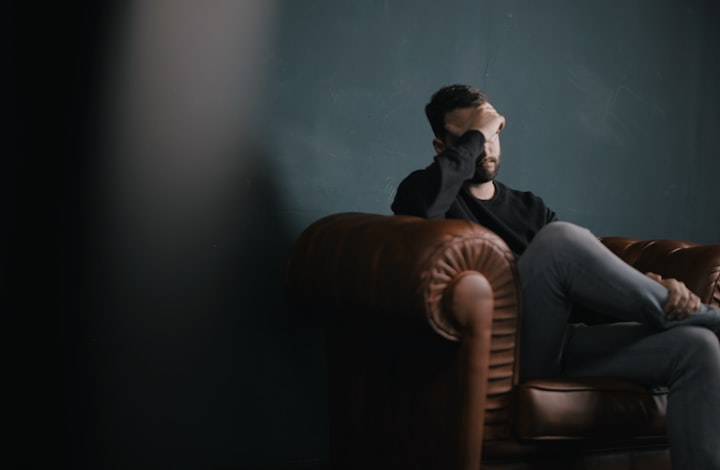Don't Ignore the Signs of Mental Health in Men
Men and Mental Health

Don't Ignore the Signs of Mental Health in Men
We ignore the stigma around mental health, which prevents many men from seeking help when they are most in need - and that is literally killing them.
Let's look at some crazy statistics. Men have had a higher suicide rate which was 3.54% higher than women. Also, at least six million men suffer from depression within the United States. Many are doing this alone as finding help or even support is near impossible.
62,000 men die due to alcohol-related causes because of untreated mental illness. Men are also more than likely to abuse drugs two to three times more than women. Yet the number of men seeking mental health treatment is far lower than women's, despite depression and suicide being the leading causes of death among men.

Facing a Harsh Stigma
Part of it may be this macho mentality. Many guys aren't keen on admitting that they have a problem. In their minds, depression is a sign of weakness. This way of thinking is outdated in the current medical paradigm, a relic of previous generations that does not reflect the current medical understanding of mental illness. We understand so much more now, and we have become aware of the chemical changes. As with diabetes or any other physical condition, mental illness can be compared to it in many ways.
Many people do not think of it that way. The stigma of mental health still exists among most people, and they still think it is a personal issue. This and the stigma and pressure men face to always be strong make it difficult for a lot of men to admit that they may need help. In terms of reducing the stigma of asking for help, we have work to do as a society. Despite our much better result in reducing stigma and expanding support options, men may still feel shame and guilt, making them less likely to seek assistance.

The impact of a toxic masculinity culture
Nonetheless, men struggle with more than just asking for help. Studies have also shown that some men have difficulty making social connections. An American Psychological Association podcast explores how masculinity can be detrimental to mental health.
It deals with toxic masculinity. This is primarily due to the way males are raised. Boys are usually raised as strong and quiet people. Look at the old John Wayne movies for an example of what we were supposed to aim for. Yet, in many ways, it's a dysfunctional model.

Men might underreport depression symptoms because of this model of masculinity. Researchers have found that certain traits associated with masculinity can also contribute to depression. Research has identified both protective and negative aspects of traditional masculinity. Substance abuse often occurs when depressive symptoms are aggravated.
The fewer men ask for help, the more likely they will suffer from depression-related symptoms. Drug abuse is often seen as a maladaptive coping mechanism. Alcohol and other drugs may be used to numb the pain of people dealing with depression, anxiety, and other mental health conditions. Our society faces the challenge of changing men's perceptions of seeking help before reaching that point.

Reduce the stigma of seeking help
It is common for men to believe they are "tough enough" to handle all their problems by themselves. The fear is that if they show vulnerability, even at the expense of their physical health, they may lose their authority.
They might be in denial that there is a problem because they think they can easily fix this problem themselves to quickly move on to the next. It is essential to end the stigma of asking for help before addressing this issue and helping men overcome it.
There must be more transparency regarding mental illness and substance abuse. We are all susceptible to stress. Sharing how it affects you with others can foster empathy, camaraderie, and support, all of which can combat the feelings of isolation that can lead to addiction and mental illness.

Education is also crucial.
There are suitable treatments available, and hope is involved, but people need to realize that they are medical problems. Suppose untreated mental health issues are not addressed. In that case, physical ailments can develop very quickly, particularly among individuals who self-medicate with alcohol and other substances.
Education and awareness are the most critical aspects of helping people as early as possible. Communicate with your family and friends. The available options are wonderful and can help, but they need to be willing to try them.

At what point should they ask for assistance?
As an individual or family member, you should be on the lookout for these signs that indicate the need for outside assistance.
• Mood changes
• A change in your work performance
• weight changes
• Anhedonia (loss of pleasure and a withdrawal from what used to be enjoyable) can be defined as feelings of sadness, hopelessness, or despair.
• It can also be manifested physically, such as headaches and stomach complaints.
It's advised that a loved one who exhibits any of these signs ask for help instead of feeling weak, since we have a lot of resources at hand this year.
It is essential to discuss self-medication with your primary care provider if you use alcohol or other drugs. Rather than suggesting an inpatient or outpatient treatment program to your loved one, it is more palatable to suggest a short visit with a specialist to determine whether a problem exists. If it seems challenging to schedule an appointment, the Hazelden Betty Ford Foundation provides free, phone-based consultations. The foundation can be reached at 877-863-8045.

Hope exists. There are resources available and learn about addiction and mental health problems. Support groups for coping with addiction and mental health issues, such as Al-Anon or Families Anonymous, or peer support groups for dealing with addiction.
Our first step in treating this problem is communicating that asking for help is okay, whether for yourself, someone you love, or anyone you think needs it. You can also share your own stories to overcome mental health obstacles. It is sometimes necessary to speak about our own struggles when reducing stigma.

Contact the National Suicide Prevention Hotline at 800-273-8255 for resources and support if you or a loved one are in an immediate crisis.
Thanks for reading my article. I hope you find many exciting ways to use your camera and become the envy of all your friends and family. Feel free to give this article a heart and share. Please subscribe to my vocal.media page and check out my other articles. A tip helps keep me caffeinated to write lots more for everyone. Join my official author newsletter here if you prefer more creative work like urban fantasy or science fiction. Subscribe to my Kofi account for unique posts and stories.
About the Creator
Matthew Angelo
I am a traditional and self-published author and content/copywriter. I write in many genres like fantasy, urban fantasy, horror, cyberpunk, grimdark, romance and science fiction.






Comments
There are no comments for this story
Be the first to respond and start the conversation.